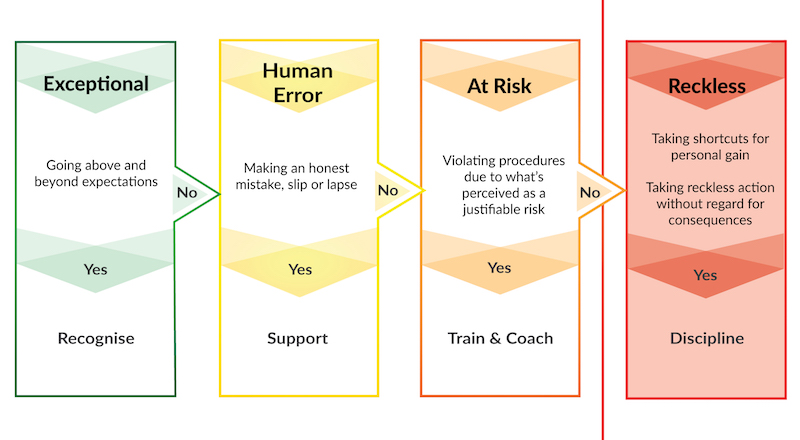Are we on the brink of a paradigm shift in aviation safety? The recent release of the European Plan for Aviation Safety 2023-2025 (EPAS), the ICAO manual on Human Performance (ICAO Doc 10151), and the forthcoming update of ICAO Annex 19 all suggest that we may be. Key Takeaways One of the common takeaways from these documents is that … Read More
Fair and Just Culture
Psychological Safety: Feeling safe to speak up?
Leaders who make the connection between resilience and psychological safety reap the benefits. We just read a wonderful HBR article written by Maren Gube and Debra Subatini Hennelly and have decided to summarise below along with our unique human factors and ultra-resilience take: Gube and Henelly (2022) highlight that as leaders, it’s crucial to recognise the connection between psychological safety and … Read More
How Human Factors and Psychology improve GCRA
Human factors and cognitive psychology offer a solution to APRA’s recent risk culture survey insights. Background Between October and December 2021, APRA rolled-out 31 survey questions to 18 of Australia’s major authorised deposit-taking institutions on their organisation’s risk management practices. The high response rate (up to 59%) suggests that governance, risk culture, remuneration and accountability (GCRA) is a … Read More
Human Factors Improves Outcomes in the Banking Industry
What happens when a financial institution takes a traditional approach to risk, with the aim to eliminate or minimise human error with procedure laden controls and a focus on individuals’ actions? Unless the industry is highly stable with very little complexity involved, it can be like trying to fit a square peg into a round … Read More
How Psychological Flexibility Increases Safety and Performance in High-Reliability Industries
What do financial traders, surgeons, miners, bankers, pit crew, pilots, and air traffic controllers all have in common? Their decisions often have life-impacting implications for themselves and others. Their roles are complex, high-risk, and require rapid decision-making under extreme pressure. To avoid catastrophe, they must manage the unexpected as efficiently, effectively, and safely as … Read More
Fair and Just Culture Best Practice
Fair and Just Culture The purpose of a Fair and Just Culture is to ensure that: All employees are treated fairly when things go wrong An atmosphere of trust is built and maintained in which employees are encouraged to provide essential safety related information The focus remains on identifying and addressing systemic issues and underlying … Read More






